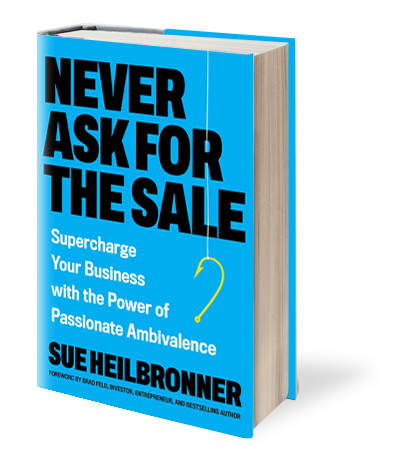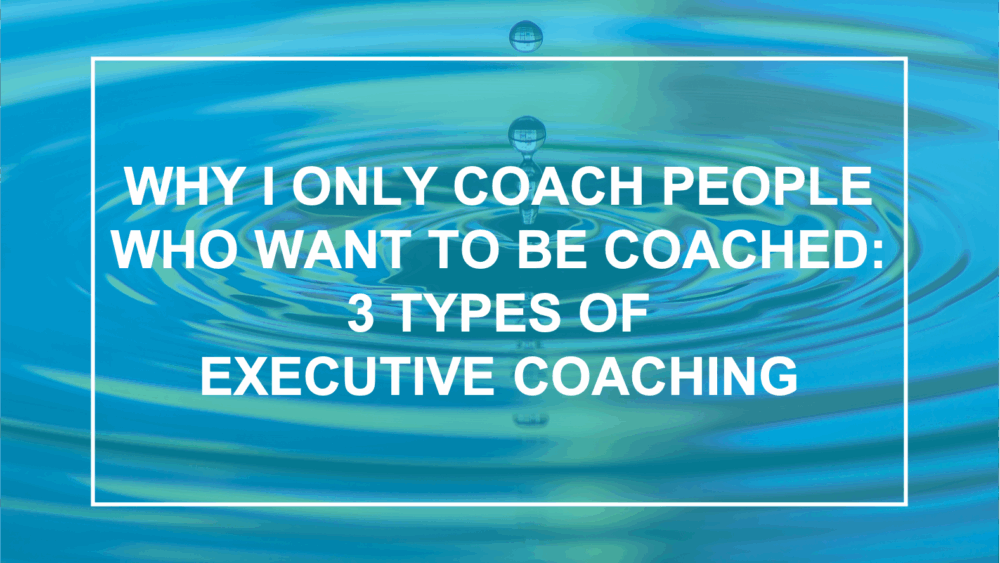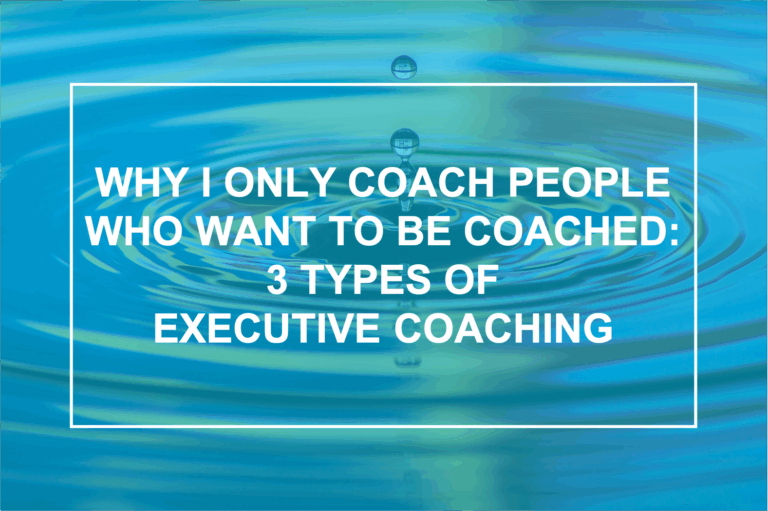Why I Only Coach People Who Want To Be Coached: 3 Types of Executive Coaching
You know I do Conscious Leadership coaching and consulting with leaders and teams as my job. My practice is blessedly pretty full, but I add individuals and companies when I have the bandwidth. I like adding revenue and growing my business.
But I like being engaged and feeling useful much more.
I put a lot of attention on spending more time in my Zone of Genius. If you haven’t heard me talk about this before, one of my valued teachers, Jim Dethmer, has this concise explanation. For me, it’s a delicious obsession to get even more specific and aligned around this, to notice the exceptions, to notice when I’m doing something I’m good at but feeling tired after doing it. That latter experience is proof that I’ve been in my Zone of Excellence. And, friends, it’s okay if I’m there at times, when I’m cooking or fixing a small broken thing in my home. But there’s no reason to be there at work for me anymore. So I pay attention, tuning in to my experience to dial in my attention even more on pursuits that enliven me.
I have figured out over the last year that it’s just no fun to work with people who don’t want to be coached. Sure. Sounds like a “duh” to me too when I type it, but Zone of Excellence can be very sexy. Revenue, as just one example, is a shiny object for an entrepreneur who has spent decades helping companies grow.
Moreover, on the other side of the coin, it can be challenging to suss out whether a prospective coaching client is willing to be coached in only a couple of quick chats. A person may be unwilling and be acting willing to fulfill the suggestion (or mandate) that they get a coach. Alternatively, a person might, for a host of reasons (say, wanting to want to seem like or be a person who wants a coach), be hiding their unwillingness from themself. It’s just not always clear, so I’m on high alert because an early decision affects how great the experience is for both of us and whether or not I’m (and they are) getting that dreamy flow effect of working in my Zone of Genius.
One thing this realization has meant for me is that I say “no” to coaching requests when they come from someone other than the prospective coaching client. Head of people, public company board member, CEO for someone who isn’t the CEO. No.
I trotted out my no recently, and someone I know pushed back and made a great case. So I said yes. And I did the pre-calls and chemistry check, and I liked the person. I sent the invoice and the “next steps” email to the shiny new client, and…crickets. I sent the “maybe my email landed in spam” email two weeks later, and more insects after an assurance it would be handled immediately.
Now there are a million good reasons that can happen. I know that. However, starting in my days as a lawyer, I’ve held the belief that you learn the most about a new employee, potential vendor, or criminal defendant in the context of negotiating the early stages of a relationship, contract, or plea deal. Bad signals early are predictive. And life is too short.
So I think there are three types of executive coaching engagements:
- Corrective Coaching: Something is wrong. Someone else reaches out about a worry (including potential legal liability) about an at-risk leader. They want to save the leader. They want you to help.
- Inflection Coaching: Something is happening. A new potential role at a current or new company, a geometric increase in scale of current role due to growth at the organization, a curiosity around whether the thing someone is doing right now is really Zone of Genius or not. The person wants a coach to help vet this real or potential shift.
- Upside Coaching: This gets to happen when a prospective coaching client is on fire. They and their endeavor are growing at a pace that may feel tough to meet. They have surrounded themself with stellar people, they are getting discerning feedback, they are ecstatic about the gold they’ve been given, and they want to put the pedal down to accelerate into the development opportunity this feedback presents. The prospect wants to up their game to meet the opportunity and seize the upside.
I do not do Corrective Coaching. That’s it. It’s final. Your person may be amazing. I believe you. And I’ll be excited to explore that more with them if they reach out to me, having learned a bit about what makes me me, and explain why the last feedback they got was so jarring that THEY want to be an EVEN BETTER leader and person. Then…maybe. Otherwise, no thank you. There are wonderful people who will do this valuable work in their Zone of Genius. I’m just not one of them. I want people who cannot wait to become more self-aware, more present, more attuned to what makes them feel alive. Those kinds of people bring meaty topics to the table. They give me great feedback that makes me better. They send me updates for years after we work together.
I occasionally do Inflection Coaching. Someone reaches out for it. We agree that we can tackle the inflection in two in-person sessions. We dive all the way in with candor, contextual understanding of the content and the climate for the inflection point. As a team, we jointly aim to make the best decision possible. I like these kinds of gigs because “change” is in my personal coaching quiver. I love the dynamic forces of life. I need to be cautious that I don’t over-rotate toward change, but when someone is stuck around an exciting possibility that will raise their game and/or raise their impact, I think my version of high fidelity listening combined with my willingness to share my thoughts through my lens (without attachment) can be jointly refreshing and clarifying.

I love Upside Coaching. Those are six-month engagements. They start at $25k for six months. This is for people who are creating ripples in the world and want to be more self-aware, present, and more aligned with their Zone of Genius. These people ask great questions and make connections between threads. They crave learning, they crave authenticity, they are usually funny, they think of business a little bit like sports, they like sports, they like me, and I like them. We have a thing. It’s a coaching thing, but it’s a thing, built of deep, mutual admiration and a commitment to shared curiosity and expansion. We talk about work and life without made-up lines, understanding that patterns cross over and that growth in one area influences the other. At this point in my journey, these people are usually C-level folks.
The thing I want to shout here is that coaching in Genius is worlds away from coaching in Excellence. In the same way as you doing what you do would be different. Being in a Genius coaching relationship sings for me and for my client. That kind of engagement amplifies joy, satisfaction, and the size of the ripples going out into the world. I want to have a resonant “YES” so that my work is as impactful and meaningful for me as it is for my clients. Anything less is a polite decline.
Ok. That’s off my mind.
When I finished a reread after this thought explosion, I felt some fear arise, and I found the story that this all sounds arrogant. If you want to learn more about upper limits like this one, read this.
If you have thoughts on this delineation, let me know. And if you can make a similar delineation about what you do, that should help you work even more in your Zone of Genius.
Rah!
Photo by Jonathan Cosens Photography on Unsplash


